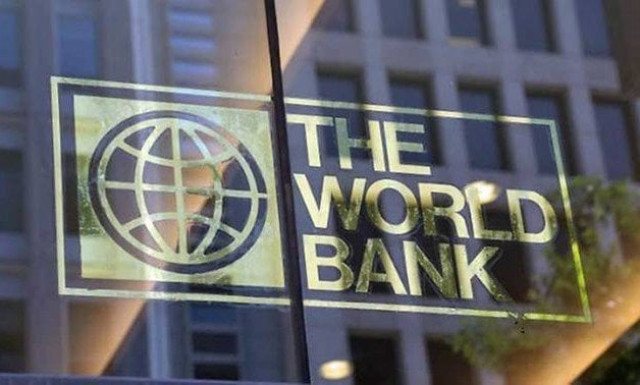Qualifying for loan: World Bank asks PTI govt to seek CCI’s nod
World Bank urges federal, provincial govts to end distortions in sales tax regimes

The logo of the World Bank. PHOTO: AFP
The Washington-based lender is urging the federal and provincial governments to end distortions in their sales tax regimes, which are currently being operated by five governments and 13 tax authorities across Pakistan.
According to the proposed framework, the collection of sales tax on services will remain with the provinces but rates and principles of collection will be common in all the territorial jurisdictions. The 1973 Constitution authorises the federal government to collect sales tax on goods while sales tax on services is being collected by the provincial governments.
“We first want that principles of harmonisation of GST are agreed among the federating units and conversations are currently taking place,” said World Bank Country Director Patchamuthu Illangovan while speaking to a group of journalists.
Eventually, a framework would be put in place before the CCI for approval, he added.
Illango maintained that the World Bank had not put any conditionality but “we will reward the performance”. “You meet the prior action, the money will come,” he added.
Illango said the World Bank’s financing was only for incentivisation but the country as a whole had to do better. “If the collection improves, it will benefit the federal and provincial governments,” he said.
The bank’s board of directors may approve a development policy credit - the Resilient Institutions for Sustainable Economy (RISE) programme - on March 19 next year.
The 13 tax authorities often do not share data with each other, which undermines tax collection.
“We are cognisant of the constitutional challenges and we are supporting this through the development policy credit (RISE),” said World Bank senior country economist Mohammad Waheed.
Waheed said different provinces were applying different principles for the determination of GST on services, which was creating confusion.
He said the World Bank acknowledged the constitutional sensitivities but “we are only proposing that the provinces continue collecting their sales tax on services, it’s their tax”.
“We are proposing that all revenue authorities should agree on a single law, which should decide about single principle of taxation, supply rules and single rate, so that the whole sales tax base is harmonised on the same principles,” said the senior economist.
If a company is working across Pakistan, it is filing 60 sales tax returns but once harmonised, there will be 12 sales tax returns, which can be reduced to four.
“There is also currently a huge compliance gap on the sales tax side, which is around 87% of the collection. The sales tax collection can be doubled to Rs3 trillion by harmonising the system,” said Waheed.
“All parties should agree to one sales tax rate and if they continue competing with each other by reducing the rates, they will be racing to the bottom,” he added.
The paying taxes indicator is the worst performing indicator because of such complications.
“Lack of political consensus on economic reforms agenda has remained a challenge in Pakistan,” said Illango. “Our plea to everyone is let’s think as a single Pakistan country instead of thinking on provincial lines.”
The World Bank has also provided $400 million in loan under the Pakistan Raises Revenue (PRR) programme, which is aimed at bringing administrative improvements in the Federal Board of Revenue (FBR) and improving its information technology systems.
Of this, $320 million is linked with the achievement of certain targets while $80 million is given for hardware installations.
Responding to a question, Illango said the World Bank had nothing to do with the Pakistan Revenue Authority.
Prime Minister Imran Khan wanted to abolish the FBR and set up the PRA but he had to retreat after FBR officials opposed the plan.
The World Bank team also spoke about the need for increasing private-sector investment and enhancing revenues to achieve sustainable economic growth.
“With 9% of GDP in private investment at present, Pakistan cannot grow more than 2.5% annually,” said Waheed.
In order to grow at a higher pace, governments follow the easiest way of ignoring structural reforms and start spending to create excess demand, which is not sustainable and leads to twin deficits, said the country economist of the World Bank.
Illango said project loan disbursements had remained slow and in the current fiscal year the disbursements would remain between $600 million and $800 million.
In response to a question about the government’s plans to spend Rs5.5 trillion in three years to stimulate economic growth, Illango said any Public Sector Development Programme (PSDP) effectiveness would rest with the whole policy and regulatory environment and even in the public sector, “if you take a long time to approve a project you would see no groundbreaking of the project”.
Illango said in case of private-sector projects, the investment climate and ease of doing business needed to be improved continuously. He added that the country was experiencing replacement of procedures and was even adding to the required procedures.
The right kind of reforms and ambitious PSDP projects could be achieved with the right kind of regulatory and procedural requirements, said the World Bank country head.
Published in The Express Tribune, December 20th, 2019.
Like Business on Facebook, follow @TribuneBiz on Twitter to stay informed and join in the conversation.



















COMMENTS
Comments are moderated and generally will be posted if they are on-topic and not abusive.
For more information, please see our Comments FAQ